Skip to main content
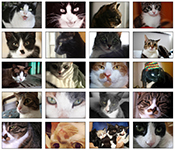 Forget social media memes — searching for cat photos is serious business for members of the Molecular Information Systems Lab.
Picture this: You are a researcher in the Molecular Information Systems Lab housed at the Paul G. Allen School. You and your labmates have developed a system for storing and retrieving digital images in synthetic DNA to demonstrate how this extremely dense and durable medium might be used to preserve the world’s growing trove of data. And you have a… Read more →
Forget social media memes — searching for cat photos is serious business for members of the Molecular Information Systems Lab.
Picture this: You are a researcher in the Molecular Information Systems Lab housed at the Paul G. Allen School. You and your labmates have developed a system for storing and retrieving digital images in synthetic DNA to demonstrate how this extremely dense and durable medium might be used to preserve the world’s growing trove of data. And you have a… Read more →
August 31, 2021
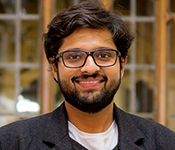 Allen School Ph.D. student Dhruv (DJ) Jain has received a Microsoft Research Dissertation Grant for his work on “Sound Sensing and Feedback Techniques for Deaf and Hard of Hearing Users.” This highly selective grant aims to increase diversity in computing by supporting doctoral students who are underrepresented in the field to “cross the finish line” during the final stages of their dissertation research.
Jain, who is co-advised by Allen School professor Jon Froehlich and Human Centered Design &… Read more →
Allen School Ph.D. student Dhruv (DJ) Jain has received a Microsoft Research Dissertation Grant for his work on “Sound Sensing and Feedback Techniques for Deaf and Hard of Hearing Users.” This highly selective grant aims to increase diversity in computing by supporting doctoral students who are underrepresented in the field to “cross the finish line” during the final stages of their dissertation research.
Jain, who is co-advised by Allen School professor Jon Froehlich and Human Centered Design &… Read more →
August 18, 2021
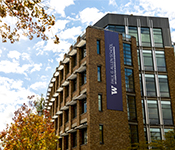 How can we endow artificial intelligence with the ability to comprehend and draw knowledge from the immense and varied trove of online documents? Is there a way to make testing and debugging of software that pervades our increasingly technology-dependent world more efficient and robust? Speaking of pervasiveness, as technologies like machine learning are more embedded into our society, how can we be sure that these systems reflect and serve different populations equitably?
Those are the questions that Allen School professors… Read more →
How can we endow artificial intelligence with the ability to comprehend and draw knowledge from the immense and varied trove of online documents? Is there a way to make testing and debugging of software that pervades our increasingly technology-dependent world more efficient and robust? Speaking of pervasiveness, as technologies like machine learning are more embedded into our society, how can we be sure that these systems reflect and serve different populations equitably?
Those are the questions that Allen School professors… Read more →
August 13, 2021
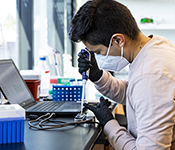 MISL researcher Nicolas Cardozo pipes cell cultures containing NanoporeTERs onto a portable MinION nanopore sensing device for processing as professor Jeff Nivala looks on. Dennis Wise/University of Washington
Genetically encoded reporter proteins have been a mainstay of biotechnology research, allowing scientists to track gene expression, understand intracellular processes and debug engineered genetic circuits. But conventional reporting schemes that rely on fluorescence and other optical approaches come with practical limitations that could cast a shadow over the field’s future progress. Now, thanks… Read more →
MISL researcher Nicolas Cardozo pipes cell cultures containing NanoporeTERs onto a portable MinION nanopore sensing device for processing as professor Jeff Nivala looks on. Dennis Wise/University of Washington
Genetically encoded reporter proteins have been a mainstay of biotechnology research, allowing scientists to track gene expression, understand intracellular processes and debug engineered genetic circuits. But conventional reporting schemes that rely on fluorescence and other optical approaches come with practical limitations that could cast a shadow over the field’s future progress. Now, thanks… Read more →
August 12, 2021
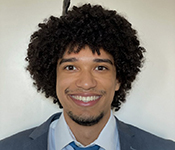 Kyle Johnson, a Ph.D. student working with professor Shyam Gollakota in the Allen School’s Network and Mobile Systems Lab, received a Generation Google Scholarship for his academic performance, leadership and commitment to diversity, equity and inclusion. The company created the scholarship to help students pursuing computer science degrees excel in technology and become leaders in the field.
As a researcher, Johnson aims to create battery-less micro robots designed to operate autonomously for prolonged periods of time, implementable as… Read more →
Kyle Johnson, a Ph.D. student working with professor Shyam Gollakota in the Allen School’s Network and Mobile Systems Lab, received a Generation Google Scholarship for his academic performance, leadership and commitment to diversity, equity and inclusion. The company created the scholarship to help students pursuing computer science degrees excel in technology and become leaders in the field.
As a researcher, Johnson aims to create battery-less micro robots designed to operate autonomously for prolonged periods of time, implementable as… Read more →
July 30, 2021
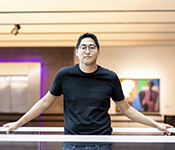 In its latest round of funding intended to strengthen the United States of America’s leadership in artificial intelligence research, the National Science Foundation today designated a new NSF AI Institute for Future Edge Networks and Distributed Intelligence (AI-EDGE) that brings together 30 researchers from 18 universities, industry partners and government labs. Allen School professor Sewoong Oh is among the institute researchers who will spearhead the development of new AI tools and techniques to advance the design of next-generation wireless edge… Read more →
In its latest round of funding intended to strengthen the United States of America’s leadership in artificial intelligence research, the National Science Foundation today designated a new NSF AI Institute for Future Edge Networks and Distributed Intelligence (AI-EDGE) that brings together 30 researchers from 18 universities, industry partners and government labs. Allen School professor Sewoong Oh is among the institute researchers who will spearhead the development of new AI tools and techniques to advance the design of next-generation wireless edge… Read more →
July 29, 2021
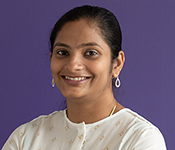 Allen School alumna Rajalakshmi Nandakumar (Ph.D., ‘20), now a faculty member at Cornell University, received the SIGMOBILE Doctoral Dissertation Award from the Association for Computing Machinery’s Special Interest Group on Mobility of Systems Users, Data, and Computing “for creating an easily-deployed technique for low-cost millimeter-accuracy sensing on commodity hardware, and its bold and high-impact applications to important societal problems.” Nandakumar completed her dissertation, “Computational Wireless Sensing at Scale,” working with Allen School professor Shyam Gollakota in the University… Read more →
Allen School alumna Rajalakshmi Nandakumar (Ph.D., ‘20), now a faculty member at Cornell University, received the SIGMOBILE Doctoral Dissertation Award from the Association for Computing Machinery’s Special Interest Group on Mobility of Systems Users, Data, and Computing “for creating an easily-deployed technique for low-cost millimeter-accuracy sensing on commodity hardware, and its bold and high-impact applications to important societal problems.” Nandakumar completed her dissertation, “Computational Wireless Sensing at Scale,” working with Allen School professor Shyam Gollakota in the University… Read more →
July 23, 2021
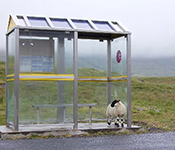 “The gray sheep is by the gray road”
Allen School professor Yejin Choi is among a team of researchers recognized by the Computer Vision Foundation with its 2021 Longuet-Higgins Prize for their paper “Baby talk: Understanding and generating simple image descriptions.” The paper was among the first to explore the new task of generating image captions in natural language by bridging two fields of artificial intelligence: computer vision and natural language processing. Choi, who is also a senior… Read more →
“The gray sheep is by the gray road”
Allen School professor Yejin Choi is among a team of researchers recognized by the Computer Vision Foundation with its 2021 Longuet-Higgins Prize for their paper “Baby talk: Understanding and generating simple image descriptions.” The paper was among the first to explore the new task of generating image captions in natural language by bridging two fields of artificial intelligence: computer vision and natural language processing. Choi, who is also a senior… Read more →
July 22, 2021
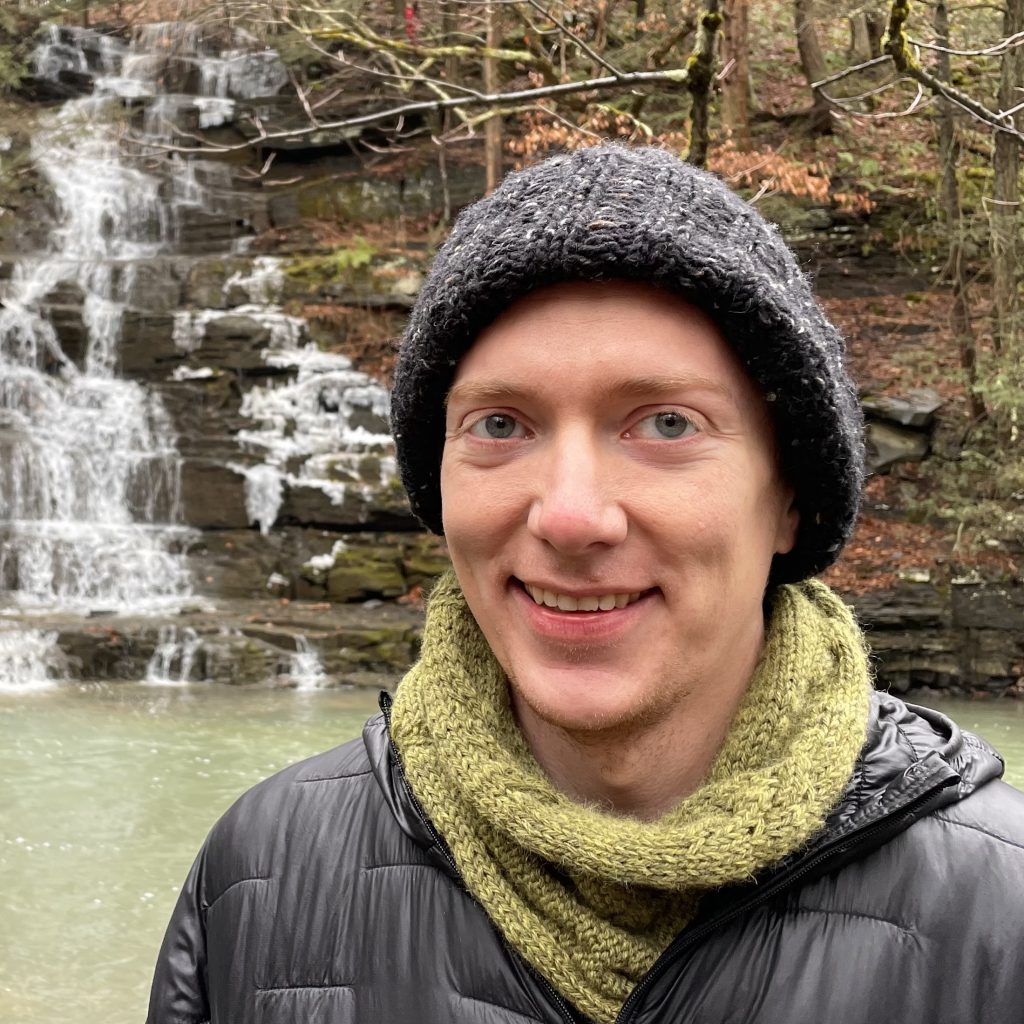 Allen School alumnus Adrian Sampson (Ph.D., ‘15) has been recognized by the IEEE Computer Society’s Technical Committee on Computer Architecture with the 2021 Young Computer Architect Award for “contributions to approximate computing and hardware synthesis from high-level representations.” This award honors an outstanding researcher who has completed their doctoral degree within the past six years and who has made innovative contributions to the field of computer architecture. Sampson, who completed his Ph.D. working with Allen School professor Luis Ceze and… Read more →
Allen School alumnus Adrian Sampson (Ph.D., ‘15) has been recognized by the IEEE Computer Society’s Technical Committee on Computer Architecture with the 2021 Young Computer Architect Award for “contributions to approximate computing and hardware synthesis from high-level representations.” This award honors an outstanding researcher who has completed their doctoral degree within the past six years and who has made innovative contributions to the field of computer architecture. Sampson, who completed his Ph.D. working with Allen School professor Luis Ceze and… Read more →
July 15, 2021
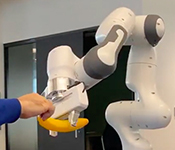 Allen School professors Maya Cakmak and Dieter Fox, along with their collaborators at NVIDIA’s AI Robotics Research Lab, earned the award for Best Paper in Human-Robot Interaction at the IEEE International Conference on Robotics and Automation (ICRA 2021) for introducing a new vision-based system for the smooth transfer of objects between human and robot. In “Reactive Human-to-Robot Handovers of Arbitrary Objects,” the team employs visual object and hand detection, automatic grasp selection, closed-loop motion planning, and… Read more →
Allen School professors Maya Cakmak and Dieter Fox, along with their collaborators at NVIDIA’s AI Robotics Research Lab, earned the award for Best Paper in Human-Robot Interaction at the IEEE International Conference on Robotics and Automation (ICRA 2021) for introducing a new vision-based system for the smooth transfer of objects between human and robot. In “Reactive Human-to-Robot Handovers of Arbitrary Objects,” the team employs visual object and hand detection, automatic grasp selection, closed-loop motion planning, and… Read more →
July 13, 2021
« Newer Posts — Older Posts »



 Allen School Ph.D. student Dhruv (DJ) Jain has received a Microsoft Research Dissertation Grant for his work on “Sound Sensing and Feedback Techniques for Deaf and Hard of Hearing Users.” This highly selective grant aims to increase diversity in computing by supporting doctoral students who are underrepresented in the field to “cross the finish line” during the final stages of their dissertation research.
Jain, who is co-advised by Allen School professor Jon Froehlich and Human Centered Design &… Read more →
Allen School Ph.D. student Dhruv (DJ) Jain has received a Microsoft Research Dissertation Grant for his work on “Sound Sensing and Feedback Techniques for Deaf and Hard of Hearing Users.” This highly selective grant aims to increase diversity in computing by supporting doctoral students who are underrepresented in the field to “cross the finish line” during the final stages of their dissertation research.
Jain, who is co-advised by Allen School professor Jon Froehlich and Human Centered Design &… Read more →
 How can we endow artificial intelligence with the ability to comprehend and draw knowledge from the immense and varied trove of online documents? Is there a way to make testing and debugging of software that pervades our increasingly technology-dependent world more efficient and robust? Speaking of pervasiveness, as technologies like machine learning are more embedded into our society, how can we be sure that these systems reflect and serve different populations equitably?
Those are the questions that Allen School professors… Read more →
How can we endow artificial intelligence with the ability to comprehend and draw knowledge from the immense and varied trove of online documents? Is there a way to make testing and debugging of software that pervades our increasingly technology-dependent world more efficient and robust? Speaking of pervasiveness, as technologies like machine learning are more embedded into our society, how can we be sure that these systems reflect and serve different populations equitably?
Those are the questions that Allen School professors… Read more →

 Kyle Johnson, a Ph.D. student working with professor Shyam Gollakota in the Allen School’s Network and Mobile Systems Lab, received a Generation Google Scholarship for his academic performance, leadership and commitment to diversity, equity and inclusion. The company created the scholarship to help students pursuing computer science degrees excel in technology and become leaders in the field.
As a researcher, Johnson aims to create battery-less micro robots designed to operate autonomously for prolonged periods of time, implementable as… Read more →
Kyle Johnson, a Ph.D. student working with professor Shyam Gollakota in the Allen School’s Network and Mobile Systems Lab, received a Generation Google Scholarship for his academic performance, leadership and commitment to diversity, equity and inclusion. The company created the scholarship to help students pursuing computer science degrees excel in technology and become leaders in the field.
As a researcher, Johnson aims to create battery-less micro robots designed to operate autonomously for prolonged periods of time, implementable as… Read more →
 In its latest round of funding intended to strengthen the United States of America’s leadership in artificial intelligence research, the National Science Foundation today designated a new NSF AI Institute for Future Edge Networks and Distributed Intelligence (AI-EDGE) that brings together 30 researchers from 18 universities, industry partners and government labs. Allen School professor Sewoong Oh is among the institute researchers who will spearhead the development of new AI tools and techniques to advance the design of next-generation wireless edge… Read more →
In its latest round of funding intended to strengthen the United States of America’s leadership in artificial intelligence research, the National Science Foundation today designated a new NSF AI Institute for Future Edge Networks and Distributed Intelligence (AI-EDGE) that brings together 30 researchers from 18 universities, industry partners and government labs. Allen School professor Sewoong Oh is among the institute researchers who will spearhead the development of new AI tools and techniques to advance the design of next-generation wireless edge… Read more →
 Allen School alumna Rajalakshmi Nandakumar (Ph.D., ‘20), now a faculty member at Cornell University, received the SIGMOBILE Doctoral Dissertation Award from the Association for Computing Machinery’s Special Interest Group on Mobility of Systems Users, Data, and Computing “for creating an easily-deployed technique for low-cost millimeter-accuracy sensing on commodity hardware, and its bold and high-impact applications to important societal problems.” Nandakumar completed her dissertation, “Computational Wireless Sensing at Scale,” working with Allen School professor Shyam Gollakota in the University… Read more →
Allen School alumna Rajalakshmi Nandakumar (Ph.D., ‘20), now a faculty member at Cornell University, received the SIGMOBILE Doctoral Dissertation Award from the Association for Computing Machinery’s Special Interest Group on Mobility of Systems Users, Data, and Computing “for creating an easily-deployed technique for low-cost millimeter-accuracy sensing on commodity hardware, and its bold and high-impact applications to important societal problems.” Nandakumar completed her dissertation, “Computational Wireless Sensing at Scale,” working with Allen School professor Shyam Gollakota in the University… Read more →

 Allen School alumnus Adrian Sampson (Ph.D., ‘15) has been recognized by the IEEE Computer Society’s Technical Committee on Computer Architecture with the 2021 Young Computer Architect Award for “contributions to approximate computing and hardware synthesis from high-level representations.” This award honors an outstanding researcher who has completed their doctoral degree within the past six years and who has made innovative contributions to the field of computer architecture. Sampson, who completed his Ph.D. working with Allen School professor Luis Ceze and… Read more →
Allen School alumnus Adrian Sampson (Ph.D., ‘15) has been recognized by the IEEE Computer Society’s Technical Committee on Computer Architecture with the 2021 Young Computer Architect Award for “contributions to approximate computing and hardware synthesis from high-level representations.” This award honors an outstanding researcher who has completed their doctoral degree within the past six years and who has made innovative contributions to the field of computer architecture. Sampson, who completed his Ph.D. working with Allen School professor Luis Ceze and… Read more →
 Allen School professors Maya Cakmak and Dieter Fox, along with their collaborators at NVIDIA’s AI Robotics Research Lab, earned the award for Best Paper in Human-Robot Interaction at the IEEE International Conference on Robotics and Automation (ICRA 2021) for introducing a new vision-based system for the smooth transfer of objects between human and robot. In “Reactive Human-to-Robot Handovers of Arbitrary Objects,” the team employs visual object and hand detection, automatic grasp selection, closed-loop motion planning, and… Read more →
Allen School professors Maya Cakmak and Dieter Fox, along with their collaborators at NVIDIA’s AI Robotics Research Lab, earned the award for Best Paper in Human-Robot Interaction at the IEEE International Conference on Robotics and Automation (ICRA 2021) for introducing a new vision-based system for the smooth transfer of objects between human and robot. In “Reactive Human-to-Robot Handovers of Arbitrary Objects,” the team employs visual object and hand detection, automatic grasp selection, closed-loop motion planning, and… Read more →
